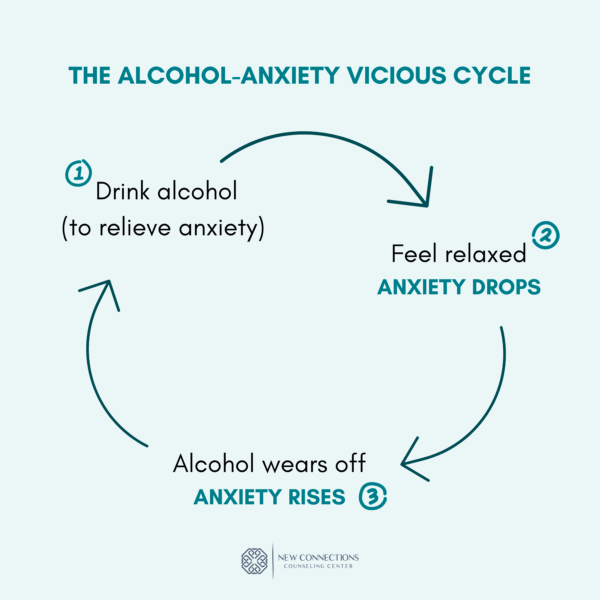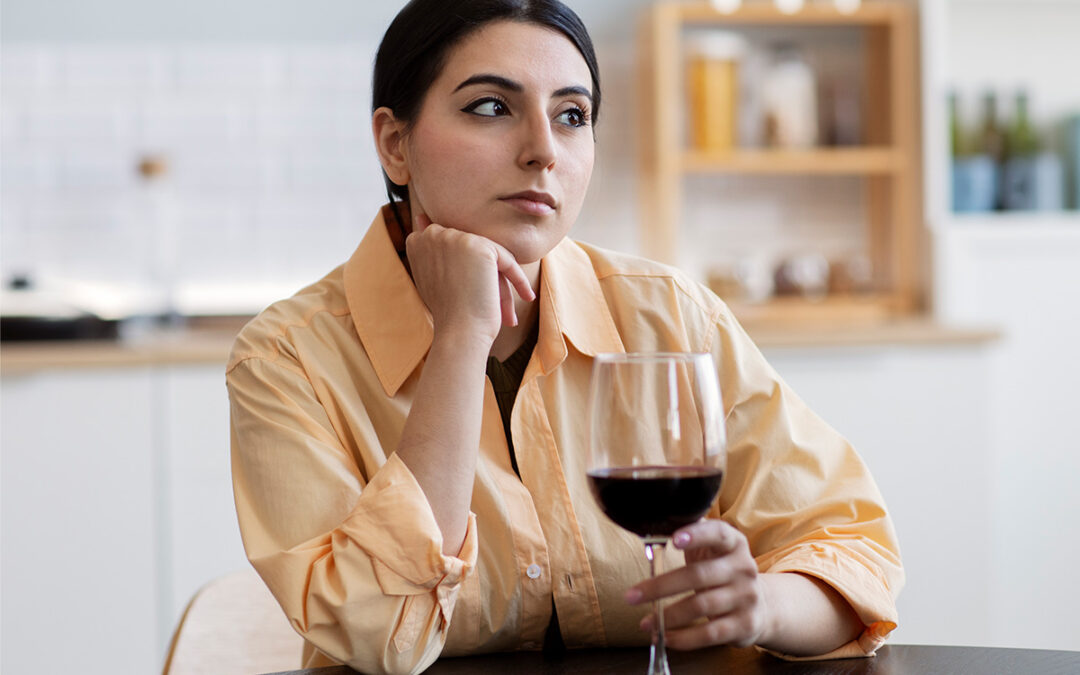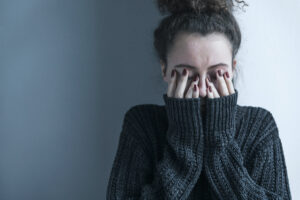Do you feel anxious after a night of drinking? Or, on the contrary, do you turn to alcohol to help you get your mind out of your troubles? Find out how alcohol can cause anxiety and 3 ways to prevent it.
If you think about having a drink you might picture yourself with a glass of wine after a long day. Or maybe going out with your friends and having a good time.
Alcohol can produce a sense of relaxation, reduce your worries and even lower your inhibitions. But if that’s so, why do many people experience anxiety after drinking? Can alcohol cause anxiety?
How does alcohol cause anxiety?
Alcohol is a depressant that affects the central nervous system. This basically means that it slows down the activity of your brain and nervous system, making you feel more relaxed.
If drinking can reduce anxiety, how does it end up worsening it? Alcohol affects the brain’s neurotransmitters, including GABA and serotonin — “feel good” chemicals that help regulate mood and anxiety. So, at first, you might feel less stressed and more calm.
However, as soon as the effects of alcohol wear off, your body will try to get these chemical levels back to normal. So, down goes calming GABA activity, and up comes excitatory glutamate activity, which will raise your anxiety.
While drinking can help you feel a temporary relief from stress, as the effects of alcohol wear off, the chemical imbalance in your brain will lead to more anxiety and restlessness.
So, not only can alcohol exacerbate anxiety, but it can create new anxiety symptoms, also known as hangxiety or hangover-related anxiety.
What is Hangxiety?
Hangxiety combines the words “hangover” and “anxiety” to name the experience of increased anxiety after a day of excessive drinking. That adds up to the unpleasant experience of the hangover itself, with all its debilitating symptoms that we all know and hate.
Sometimes, this can be so debilitating that we want to cross out alcohol from our lives completely. So, why do we keep falling back into this cycle?
The Alcohol and Anxiety Cycle
It’s quite common for alcohol abuse and anxiety to occur together. In fact, about 20% of people in the US with an anxiety or mood disorder also have an alcohol or other substance use disorder.
If you are drinking to alleviate your anxiety, it can easily turn into a vicious cycle that works against you. You drink, you temporarily feel calmer, anxiety hits you the next day and then you drink more to relieve that anxiety. That’s how you get caught in the cycle.

Over time, this can lead to alcohol dependence as your body will crave for alcohol to function. The more you’ll keep drinking, the more your body will gain tolerance — which means you will need a larger amount to feel the same effects. Furthermore, whenever you try to quit, the withdrawal symptoms will trigger your anxiety, pushing you back into the cycle.
Dealing with Hangxiety: 3 Ways to Prevent Alcohol from Causing Anxiety
1. Rethink your relationship with alcohol
If drinking has become a way to cope with stress, you may want to revisit your habits and consider cutting back. Whether alcohol is causing your anxiety or your anxiety is ramping up to alcohol abuse, don’t ignore it.
Be mindful of the role alcohol plays in your emotional state and the way you deal with problems. Taking a closer look at your alcohol consumption can help you break the alcohol-anxiety cycle and discover new healthier ways to cope.
2. Don’t overlook sleep
While many of us might feel sleepy after a couple of drinks, alcohol actually disrupts our natural sleep cycle. So, even if you sleep the same number of hours (or more to try to “compensate”), you’ll probably still feel tired and in a low mood the next day.
As alcohol disrupts the sleep cycle, it creates an imbalance between slow-wave sleep and REM sleep, which impacts sleep quality. That is why you might feel less rested even if you sleep more.
To minimize the negative impact on your sleep quality, avoid drinking alcohol at least four hours before sleeping, this should give your body enough time to metabolize it. However, keep in mind that the effects of alcohol are different for each person, and even small quantities can affect sleep for some.
3. Seek help from a professional
Are you having a hard time cutting back on your drinking? Do you feel your anxiety worsening despite your efforts to get it under control? Don’t beat yourself up, you are not alone in this struggle. Once you get caught in the alcohol-anxiety vicious cycle, breaking yourself out without help can be difficult.
Talking with a therapist about alcohol abuse can help you manage your anxiety without falling back into old patterns. Whether you’re trying to quit drinking or just cut down a little, we can help you reach the goals that you want. Our therapists’ approach is entirely focused on each client’s specific needs and background, in a supportive and non-judgmental way.
Therapy for Alcohol Abuse in Baltimore, MD
Do you find yourself craving a drink after a bad day? Does alcohol help you relax? Or does it get in the mood for situations where you feel uncomfortable?
If alcohol has become a way to cope with anxiety, you could be dealing with an alcohol dependence or alcohol abuse. Our therapists at New Connections can help you explore the sources of stress in your life and develop new tools to manage your anxiety and negative emotions.
Rather than simply focusing on not drinking, we will help you achieve what is most important and meaningful to you. Contact us to know more or schedule a free 15-minute intake call.






